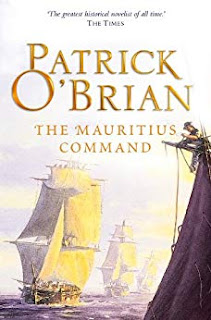Rating: 5/5
Review:
The fourth in a brilliant series
This is now my third time reading through this brilliant
series and I am reminded again how beautifully written and how wonderfully,
addictively enjoyable they are.
In The Mauritius Command, Jack is finding shore-bound domestic life somewhat less blissful than he had anticipated, but through Steven's machinations is given command of a squadron to fight in the Indian Ocean where French warships are playing havoc with the Company's trade. As always, there is a gripping, varied narrative and some thoughtfully drawn characters – especially the capricious and enigmatic Lord Clonfert, whom I found a real source of interest and subtlety in this episode.
In The Mauritius Command, Jack is finding shore-bound domestic life somewhat less blissful than he had anticipated, but through Steven's machinations is given command of a squadron to fight in the Indian Ocean where French warships are playing havoc with the Company's trade. As always, there is a gripping, varied narrative and some thoughtfully drawn characters – especially the capricious and enigmatic Lord Clonfert, whom I found a real source of interest and subtlety in this episode.
Patrick O'Brian is steeped in the period of the early 19th Century and his knowledge of the language, manners, politics, social mores and naval matters of the time is deep and wide. Combined with a magnificent gift for both prose and storytelling, it makes something very special indeed. The books are so perfectly paced, with some calmer, quieter but still engrossing passages and some quite thrilling action sequences. O'Brian's handling of language is masterly, with the dialogue being especially brilliant, but also things like the way his sentences become shorter and more staccato in the action passages, making them heart-poundingly exciting. There are also laugh-out-loud moments and an overall sense of sheer involvement and pleasure in reading.
I cannot recommend these books too highly. They are that rare thing; fine literature which are also books which I can't wait to read more of. Wonderful stuff.










